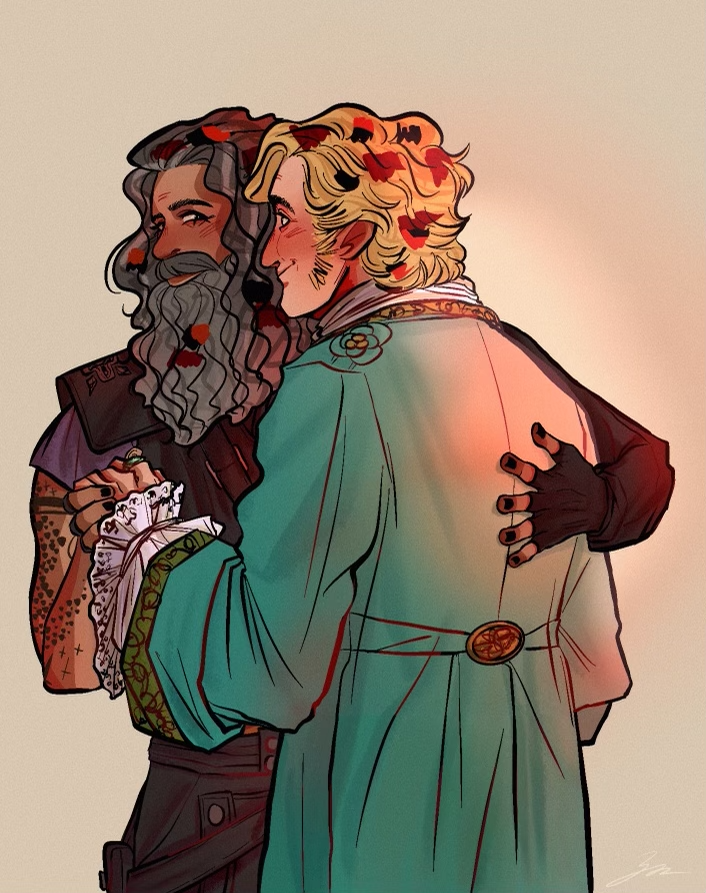Gunn senior Zina Zhang scrolls through her social media feed and notices fanart and many posts and discussions for a new series, ‘Our Flag Means Death.’ After deciding to check it out, she is immediately hooked and even draws fanart of her own.
“Our Flag Means Death” has received praise for its LGBTQ representation, beloved characters and lighthearted mood.
The historical romantic comedy is set in the 1700s and follows protagonist Stede Bonnet, an aristocrat who suddenly abandons his life and family to become a pirate. Together, Bonnet and his newly gathered crew endure obstacles like clashing with the infamous pirate captain Blackbeard.
Most of the characters are queer, subverting the norm of a predominantly cisgender and straight cast.
The show also depicts a variety of healthy, loving relationships including gay couples like Bonnet, who falls in love with another man.
Another character, Jim, played by nonbinary actor Vico Ortiz, is nonbinary and transmasculine and uses they/them pronouns. When the crew finds out Jim is transmasculine, the crew easily accepts it and moves on.
Zhang said she enjoys “Our Flag Means Death” because it introduces complex characters. And unlike other shows, Zhang said this one doesn’t play into stereotypical portrayals of stoic, tough men.
“In media, men are usually emotionally repressed,” Zhang said. “But in ‘Our Flag Means Death,’ if a character feels something, they actually express themselves. We see tears falling and men emotionally reaching out to each other.”
Not only does the show display examples of healthy masculinity and emotions, it also creates a range of queer characters with unique traits. Some are more outgoing and flamboyant, while others are quieter. Some are more traditionally masculine, while others are not.
Paly senior Jade de Anda said she appreciates the LGBTQ representation in “Our Flag Means Death,” highlighting the subtlety and normalization of queer relationships.
“(Being queer) is normalized and part of (the show’s) world,” de Anda said. “Characters are gay, and it is what it is. It’s not something that’s put in the spotlight simply to gain a larger following, it’s put there because people deserve to be represented.”
Compared to other shows, de Anda said “Our Flag Means Death” is a big improvement for representation in media particularly because it clearly depicts a gay relationship.
“A lot of characters in other shows that I thought would be in a relationship would never (be) put into a relationship outwardly; they (were) always just ‘implied’ to be part of the LGBTQ community,” de Anda said. “So I’m really glad (the show) put a gay relationship out in the open like that.”
Paly senior Grace Muma agrees with de Anda and said the show subverts tactics used by producers to gain the appeal of LGBTQ audiences without actually showing a queer relationship on screen, also known as queerbaiting.
“The show isn’t queerbaiting like a lot of shows do, where they just toe the line between having representation but not fully committing to it so they can still retain the largest audience possible,” Muma said.
Zhang also said she commends “Our Flag Means Death” for not falling into common harmful tropes in media like the killing of queer characters, most notably done by TV series such as “Supernatural,” “Killing Eve” and “The 100.”
Furthermore, she said “Black Sails,” similar to “Our Flag Means Death,” is a show set in the 1700s focusing on queer pirates, yet some of its queer relationships end in tragedy, another overused trope.
The tendency for queer characters to be killed, especially after a revelation of their queer identity, ultimately perpetuates the idea that queer people are expendable or will never find happiness.
“David Jenkins, the producer of ‘Our Flag Means Death,’ said in an interview (that) it was going to have a romantic, happy ending,” Zhang said. “That brings hope to the viewers because usually, not a lot of queer people get a good ending in TV shows, or any ending at all — they’re just written off.”
Historical movies and TV shows, especially ones set before the 20th century, almost never have queer representation. Even the few shows that are set in the 1700s and 1800s, including “Harlots,” a feminist and lesbian perspective on London brothels, “Gentleman Jack,” based on a historical English lesbian figure, and “Black Sails,” only have cisgender characters.
In comparison, “Our Flag Means Death” includes characters with different sexualities and non-binary characters, who are often underrepresented in media.
“Including variety (in genders) just brings the show to life because I highly doubt everyone back then was all, ‘I’m a man,’ or ‘I’m a woman,’” Zhang said.
Because of the show’s open and healthy representation of queer relationships, de Anda said “Our Flag Means Death” went above and beyond, and she’s excited to see how it will proceed.
“When I first started watching, I didn’t really know what to expect other than pirates,” de Anda said. “However, it exceeded my and especially the LGBTQ community’s expectations, and I really hope it gets renewed for season two.”

